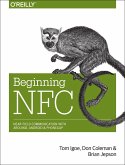The use of open-source software (OSS)--readable software source code that can be copied, modified, and distributed freely--has expanded dramatically in recent years. The number of OSS projects hosted on SourceForge.net (the largest hosting Web site for OSS), for example, grew from just over 100,000 in 2006 to more than 250,000 at the beginning of 2011. But why are some projects successful--that is, able to produce usable software and sustain ongoing development over time--while others are abandoned? In this book, the product of the first large-scale empirical study to look at social, technical, and institutional aspects of OSS, Charles Schweik and Robert English examine factors that lead to success in OSS projects and work toward a better understanding of Internet-based collaboration.
Hinweis: Dieser Artikel kann nur an eine deutsche Lieferadresse ausgeliefert werden.
Hinweis: Dieser Artikel kann nur an eine deutsche Lieferadresse ausgeliefert werden.








